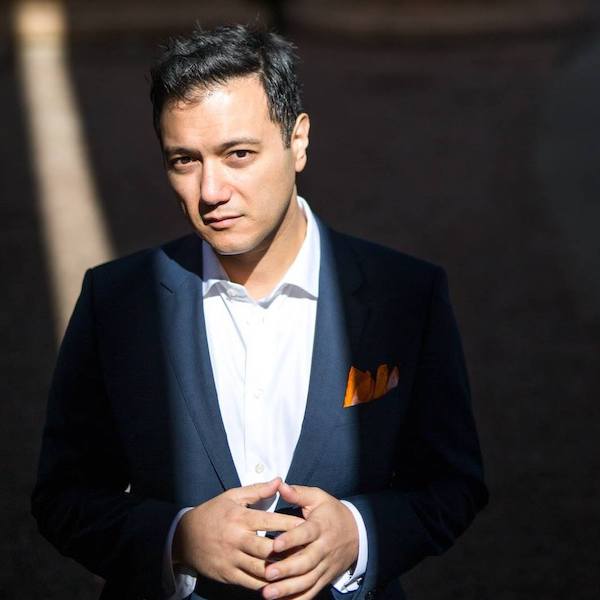Phan’s engaging artistry spotlights New World’s French chamber program

The New World Symphony’s chamber music program on Sunday was titled “The French Voice,” mixing mostly French and Gallic inspired art songs with two instrumental standards.
Tenor Nicholas Phan was unquestionably the afternoon’s star. From the moment he took the New World Center’s stage, Phan exhibited authoritative command of diverse vocal offerings, an engaging personality and a voice that seemed born to sing French opera and song.
In the tradition of Mediterranean tenors of a bygone era, Phan sings with a light, airy timbre and can produce soft high notes in head voice. He also commands a firm lower register and can summon reserves of power when called for.
Saint-Saëns’ “Violins in the Night,” Phan’s opening selection, is based on a poem by Anna de Noailles. The sound of a violin disrupts the night, bringing forth passions that reek below the surface. Phan’s stylistic aplomb and ability to paint a scene were immediately on display. The sugar-tinged, quick rubato of Michael Turkell’s violin and Thomas Steigerwald’s keyboard accompaniment set the storm-tossed milieu.
The pop culture references, whimsy and genre mashups of the post World War I French composers’ group Les Six were on display in Francis Poulenc’s Cocardes, a setting of three nonsensical poems by Jean Cocteau. “Honey from Narbonne” and “Nanny” are recitations of lists of unrelated words while. “Circus Troupe Kid” is a neo-classical polka. Phan quipped “vocal chamber music needs more bass drum” and indeed the accompanying ensemble is a cross between ad hoc street players and a subpar group at an open-air band concert. Phan projected the wit and insouciance of Poulenc’s zany melodic splotches. The deliberately ragtag instrumental backdrop was skillfully handled by violinist Zachary Ragent, Gianluca Farina on tinny cornet, Michael Daley and Kevin Ritenauer on percussion and, especially, Gyuangwei Fan whose whacky trombone slides encapsulated the songs irreverence.
Jake Heggie is one of America’s most acclaimed opera composers. Heggie’s Dead Man Walking and Moby-Dick have been widely performed. (The Met will produce Dead Man Walking next season.)
In 2008 Heggie wrote the song cycle Friendly Persuasions, Homage to Poulenc. With texts by Heggie’s longtime collaborator Gene Scheer, each of the four sections is devoted to a close friend or artistic associate of Poulenc.
In the opener, legendary harpsichordist Wanda Landowska chastises Poulencin clipped declamation for being late in writing his harpsichord concerto while the composer admits his homosexuality to languorous riffs. Poulenc’s frequent recital partner Pierre Bernac is pictured coldly unimpressed with a song equating sleep and death, leading to Poulenc destroying the music.
The heart of this beautifully crafted work is the homage to Poulenc’s childhood friend Raymonde Linossier who introduced him to many prominent contemporary artists and musicians. Scheer’s text mirrors Poulenc’s own writings about Ms. Linossier and Heggie’s darkly evocative melodies and soaring writing for the flute really take wing. The final line “Part of my life will always belong to you” caps a deeply moving vignette.
Harsh martial chords picture Poulenc’s meeting with resistance poet Paul Ėluard in Nazi occupied Paris during World War II. A burst of lyrical song encompasses Poulenc’s setting of an Ėluard poem while terse piano strokes suggest his fear.
Phan brought subtlety and clear enunciation to the first three songs and unleashed the full power of his instrument for Poulenc’s wartime trauma. Jack Reddick’s shining flute took top honors with fine contributions by clarinetist Kelsi Doolittle, cellist Ben Fryxell and Steigerwald in the accompanying ensemble.
Phan concluded the program with Schubert’s “On the River.” Composed in 1828, the final year of Schubert’s life, the song is a homage to Beethoven who died the year before. The funeral march from Beethoven’s Eroica symphony is directly quoted in the song. Phan’s aristocratic phrasing and supple gradations of tone and volume clearly mark him as a master of lieder and song literature. Wesley Ducote gave attentive keyboard support and Roy Femenella played the exposed, mood setting horn part superbly.
The concert opened with Ravel’s gleaming Introduction and Allegro for harp and ensemble. New World alumna Grace Browning, now a member of the Rochester Philharmonic, played the harp’s leading role with precision, bringing elegance to the exposed thematic writing. Jesse McCandless’ mellow clarinet, Reddick’s lovely flute and the tonal warmth of violinists Sergio Carleo and Ka-Yeon Lee, violist Marlea Simpson and cellist Amy Sunyoung Lee contributed to a sparkling reading.
The String Quartet No. 4 in C Major is the work of the sixteen year old Mozart, one of the six Milanese quartets written during a journey to Italy. Opening with an Allegro reminiscent of Mozart’s string divertimentos and closing with a Presto, the somber central Adagio reaches a higher musical plain. Violinists Dillon Welsh and Jung Eun Kang, violist Gabe Napoli and cellist Emily Yoshimoto offered well integrated playing. Some of the soft passages in the slow movement were on the edge of audibility, so refined were the group’s dynamics. Fast movements were brisk, the finale touched with a dose of gypsy paprika.
The New World Symphony chamber music series continues 2 p.m. March 15 with guest harpsichordist Mahan Esfahani playing C.P.E. Bach’s Quartet in A minor, Haydn’s String Quartet in D minor, Xenakis ’Oophoa, Schütz’s three excerpts from The First Book of Madrigals, Reicha’s Variations for Bassoon and String Quartet and Górecki’s Harpsichord Concerto. nws.edu; 305-673-331
Posted in Performances
Leave a Comment
Mon Feb 24, 2020
at 12:34 pm
No Comments